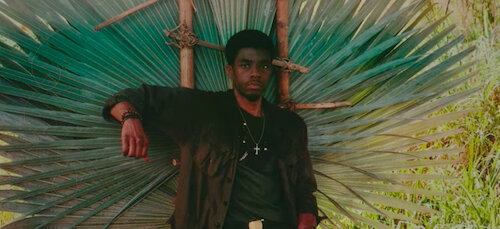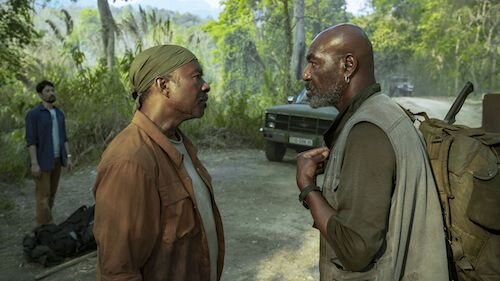Da 5 Bloods
When BlackkKlansman dropped in 2018, the world saw celebrated director Spike Lee return to the best of his capabilities. Maybe it was the story that Lee couldn’t pass up. Maybe it was just a brief surge. No one knew for sure, but it was a caliber of filmmaking that everyone hoped would stick around. Today, with the release of the Netflix war drama Da 5 Bloods, we now know for certain that Spike Lee is back for good. Like Kathryn Bigelow and her The Hurt Locker rejuvenation, Lee seems to be hitting an all new stride. Considering we’re only two films in, I can’t wait to ride this wave.
Like Bigelow teaming up with Mark Boal, Lee worked with screenwriter Kevin Willmott (who he won an Academy Award with for BlackkKlansman) again for Da 5 Bloods, by completely rewriting a screenplay by Danny Bilson and Paul De Meo. Instead of having a Vietnam War veteran quest to find and return gold, Lee and Willmott went the extra mile to discuss race relations in today’s world. It’s absolutely impossible to discuss Da 5 Bloods without bringing up the recent push of the Black Lives Matter movement, especially considering the documentary (and docufiction: I’m talking about the real events acted out) elements that Lee includes in most of his works. In Da 5 Bloods, there is actually a connection to Black Lives Matter, and other African American charities and current conversations. There is no chance in hell Lee was able to pull these sequences off in a week. This injustice has been on Lee’s mind for decades. It’s been on many minds. Black lives have always mattered. You can say the release of Da 5 Bloods is a coincidence, but the importance of change was always there.
The remaining veterans — and other group members — on their quest back.
Even without the political relevance, Da 5 Bloods is so well crafted that it is — without question — the first awards season player of 2020. Sure, the year has been a bit wonky, and the latter months are going to be as stacked as ever. That still shouldn’t undermine how spectacular Da 5 Bloods is. The film toys around with aspect ratios (a gorgeous wide screen view that gets condenses into a ‘60s appropriate 16mm illusion), sound mixing (the gun fire back in the “‘60s” is much more condensed than the bombastic bursts in the present day) and shot selections (many static shots for the flashbacks, and much more fluidity in the modern scenes) to create cinematic parallels, as a means of dividing the story between the past and the now. This, amongst many other fantastic techniques (to be discussed soon) should at least have Spike Lee back in the discussion for Best Director.
Four Vietnam War veterans are on a quest to revisit the burial location of their slain group captain “Stormin’” Norman, whilst trying to rediscover the gold that they all uncovered during the war and subsequently hid. Each member needs the gold for different reasons. Right away, the camaraderie is present, but so is the toxicity, particularly instilled by conflicting member Paul (who identifies himself as a Donald Trump supporter and is openly bigoted and resentful). Never a storyteller to sugarcoat societal complexities, Lee dives right into the intolerance found deeply within even cultural mosaics, so there isn’t a one-sided argument being portrayed here (despite what the lowish IMDb score by salty internet users may lead you to believe). Within the two and a half hour long runtime, you see the many sides of war changed individuals, and how they compare (and clash) with politically affected civilians. It’s impossible to cover every side of such a multi faceted discussion, but through characters like Paul (and his many interactions with others), Lee tries his damndest.
Stormin’ Norman upon the discovery of bad news back home.
On the topic of Paul, I’ll say what I can only gather that everyone else has been saying (I hope). Delroy Lindo is the absolute first person of 2020 to be in the discussion of winning an Academy Award. Sure, the awards season race can change at any time, but I honestly believe his performance is powerful enough to last over six months into next year’s nomination selection and even the awards deliveries. It is Delroy Lindo we’re talking about, who usually steals the scene he’s in. Having said that, I still have never seen him better. Between his sensational emotional acting (bolstered by rage and suppressed sadness, underneath his bigotry) and the extra little things (his self reflections done via breaking the fourth wall), Lindo essentially runs away with a film that was already fantastic in most fronts, which is something only a brilliant thespian can do. Toss in great performances by the rest of the five bloods (Clarke Peters, Norm Lewis, Isiah Witlock Jr., and Chadwick Boseman), other supporting roles (played by Jonathan Majors, Mélanie Thierry, Jean Reno, Paul Walter Hauser, and a still-underrated-and-under-utilized Jasper Pääkönen [I see you]), Da 5 Bloods is driven by stellar acting.
Outside of the slowish second quarter (as a means of leaving you vulnerable for the anxious second half of the film), Da 5 Bloods is a relentless film from start to finish. Even the downtime is usually uncomfortable for one reason or another, either because of a confrontation or a discussion being held. The more sluggish moments are much sweeter in retrospect, because we realize Lee is giving these veterans the time to enjoy what they discover, and also be humanized as fully fledged beings (in both the positive cheers and the debates held). When you reach the latter portions of the film (which do not hold back by any means), you’ll be wanting to go backwards to those more peaceful moments. Between the moral dilemmas and the more literal tribulations, the last hour of Da 5 Bloods is constant panic.
Paul and Otis having a heated discussion.
Even Spike Lee’s less successful efforts are at least interesting, given his fluency of the cinematic language. So, his triumphs — like Da 5 Bloods — only get even better. This includes a huge use of the political works of Marvin Gaye (including a version of “What’s Going On” stripped of its instrumentals, so Gaye can still be heard while the sounds of each shot still ring out), some tight editing work by Adam Gough (jumping between images and documentary footage and the film, as well as the wonderful “Martin Luther King Jr.” scene; you’ll have to watch to know what I mean), and other Lee staples (can’t be a Lee film without a dolly shot near the end!).
In 2020 (especially this far into this… year…), a film that showcases these particular statements and expressions couldn’t have come at a better time. Then, there’s the greed aspect: what should we do with all of this gold? Can money tear people apart? Sure, I can imagine the original screenplay was quite great, if we can still see the remnants in the form of this return mission. However, with what Lee has brought as a voice, and what Lee and Willmott have added as writers, is so important to why Da 5 Bloods will stick with you. Outside of the blood, the action, the drama, the social complexities, and all of that, you have a resolution that is exactly what we needed right now, in an America (and a world) fighting for changes. It’s the kind of answer that can remind you of what really fulfills life. Just like Fiona Apple’s perfect album Fetch the Bolt Cutters (which was made largely at home and with household objects to discuss current political themes, made well before a COVID-19 world), Da 5 Bloods was another 2020 gift that we needed to wrap our heads around the political climate as of late. It’s another gem in Spike Lee’s illustrious filmography, and a film that will likely be discussed for the rest of the year for many reasons.
Andreas Babiolakis has a Masters degree in Film and Photography Preservation and Collections Management from Ryerson University, as well as a Bachelors degree in Cinema Studies from York University. His favourite times of year are the Criterion Collection flash sales and the annual Toronto International Film Festival.









